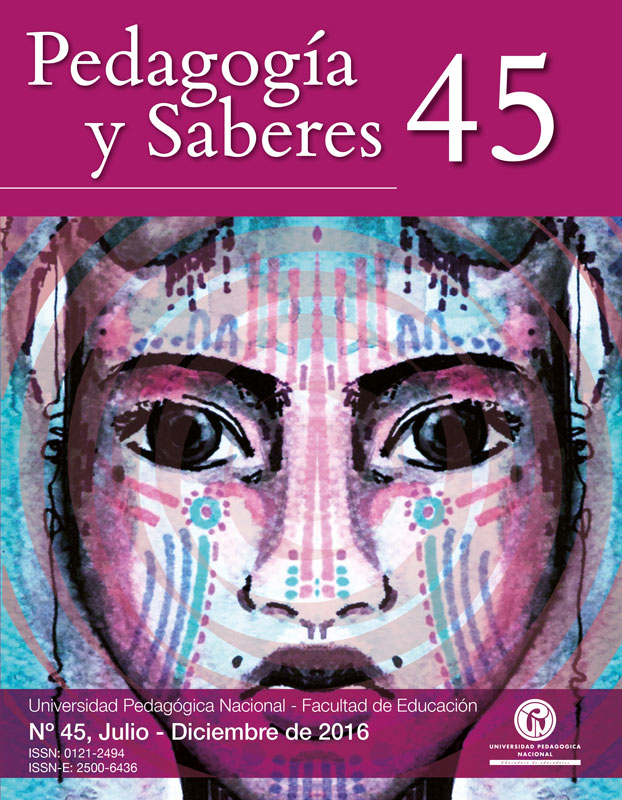El futuro de la educación en una sociedad del conocimiento: el argumento radical en defensa de un currículo centrado en materias
Resumen
Mucho se escribe en las políticas educativas actuales sobre la preparación de los estudiantes para una sociedad del conocimiento y el importante rol desempeñado por la educación. Esas políticas, sin embargo, dicen muy poco sobre el papel mismo del conocimiento en esta (Young, 2009a). En otras palabras, ¿qué es lo que importa que nuestros jóvenes sepan? Aún más preocupante que eso, muchas políticas actuales casi que de manera sistemática ignoran o marginalizan la cuestión del conocimiento.
Citas
Abbott, A. (2001). Chaos of disciplines. Chicago: Chicago University Press.
Barnett, M. (2006). Vocational knowledge and vocational pedagogy. En M. Young y J. Gamble (eds.). Knowledge, curriculum and qualifications for South African further education. Pretoria: hsrc Press.
Bernstein, B. (2000). Pedagogy, symbolic control, and identity: Theory, research, critique. Oxford: Rowman & Littlefield.
Charlot, B. (2009). School and the pupils’ work. Sísifo. Educational Sciences Journal, 10, 87-94. Recuperado de http://sisifo.fpce.ul.pt.
Christie, F. y Maton, K. (de próxima aparición, 2011). Disciplinarity: Functional Linguistics and Sociological Perspectives. Londres: Continuum.
Durkheim. E. (1983). Pragmatism and sociology (J. C. Whitehouse, trad.). Cambridge: Cambridge University Press.
Gibbons, M.; Limoges, C.; Schwartzman, S.; Nowotny, H.; Trow, M. y Scott, P. (1994). The new production of knowledge: The dynamics of science and research in contemporary societies. Londres: Sage.
Gove, M. (2009). Failing schools need new leadership. Recuperado de http://michaelgovemp.typepad.com/files/ gove-2009-conference-speech-2.pdf.
Kronman, A. (2007). Education’s end: Why our colleges and universities have given up on the meaning of life. New Haven: Yale University Press.
Marrero, A. (2008). Hermione en Hogwarts o sobre el éxito escolar de las niñas. Mora (B. Aires), 14(1), 29-42. Recuperado de: http://www.scielo.org.ar/scielo. php script=sci_arttext&pid=S1853001X2008000100 002&lng=es&nrm=iso
Moore, R. (2004). Education and society: Issues and explanations in the sociology of education. Londres: Polity Press.
Moore, R. (2011). Making the break: Disciplines and disciplinarity. En K. Christie y K. Maton (2011).
Muller, J. (2011). Through other’s eyes; the fate of disciplines. En K. Christie y K. Maton (2011).
Oates, T. (2009). Missing the point: Identifying a wellgrounded common core. Cambridge: Cambridge Assessment.
White, J. (2007). What schools are for and why? Impact, 14. Recuperado de http://www.philosophy-of education. org/impact/impact_details.asp?id=14 DOI: https://doi.org/10.1111/j.2048-416X.2007.tb00116.x
Yates, L. & Young, M. (2010). Globalisation, knowledge and the curriculum. European Journal of Education, 45(1), 4-10. DOI: https://doi.org/10.1111/j.1465-3435.2009.01412.x
Young, M. (1971). Knowledge and control: New directions for the sociology of education. Londres: Collier-Macmillan.
Young, M. (1998). The curriculum of the future. Londres: Routledge. DOI: https://doi.org/10.4324/9780203209295
Young, M. (2008). Bringing knowledge back. En From social constructivism to social realism in the sociology of education. Londres: Routledge. DOI: https://doi.org/10.4324/9780203073667
Young, M. (2009a). Education, globalisation and the ‘voice of knowledge’. Journal of Education and Work, 22(3), 193-204. DOI: https://doi.org/10.1080/13639080902957848
Young, M. (2009b). What are schools for? En H. Daniels, J. Lauder y J. Porter (eds.). Knowledge, values and educational policy (pp. 10-18). Londres: Routledge.
Young, M. (2010). Alternative educational futures for a knowledge society. European Educational Research Journal, 9(1), 1-12. DOI: https://doi.org/10.2304/eerj.2010.9.1.1
Young, M. (2011). Why educators must differentiate knowledge from experience. Pacific Asian Education, 22(1).
Young, M. y Muller, J. (2010). Three educational scenarios for the future: Lessons from the sociology of knowledge. European Journal of Education, 45(1), 11-27. DOI: https://doi.org/10.1111/j.1465-3435.2009.01413.x
Descargas
Derechos de autor 2016 Pedagogía y Saberes

Esta obra está bajo una licencia internacional Creative Commons Atribución-NoComercial 4.0.






















